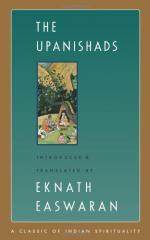|
This section contains 4,902 words (approx. 17 pages at 300 words per page) |

|
SOURCE: Fort, Andrew O. “Going or Knowing? The Development of the Idea of Living Liberation in the Upanisads.” Journal of Indian Philosophy 22, no. 4 (December 1994): 379-90.
In the following essay, Fort focuses on the Upanishads's treatment of mukti, or freedom, exploring the idea that it can be attained only after death versus the belief that it is entirely possible to gain liberation during one's life on earth.
The idea of liberation while living or jīvanmukti has been much discussed in Advaita Vedānta and other schools of Indian thought. The notion of jīvanmukti found in Advaita was developed and elaborated over many centuries, and did not become a formal doctrine until after the time of Śadnkara, Advaita's founder.1 Still, the basic elements of the Advaitin conception of jīvanmukti can be traced back to the earliest Upaniṣads. There we find both the idea that one...
|
This section contains 4,902 words (approx. 17 pages at 300 words per page) |

|


